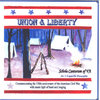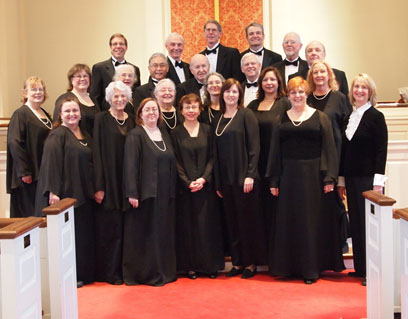
ReviewsScholaCantorum Walking into Hampton’s First Presbyterian Church for the Schola Cantorum concert January 30, audience members were welcomed by re-enactors in Union military uniforms, neatly trimmed beards and period eyeglasses — a fitting introduction to the "Union and Liberty” theme honoring the 150th anniversary of the American Civil War. The program drew from a variety of sources: African-American spirituals, immigrant folk songs and ballads of the period. A pre-Civil War spiritual arranged by Andre Thomas, Keep Your Lamps! showcased Schola’s good a cappella blend and clear diction in the friendly acoustics of the venue — neither dry nor overly reverberant, just eminently clear. It was followed by the English folk tune O Waly, Waly, in a John Rutter arrangement, with some very un-period harmonies, whose lovely, floating “ooohs” provided a background for soloists Rebecca Young and Michelle Castillo. In another spiritual, Deep River, a rich bass grounding supported the rest of the voices, and the chorus seemed to be “tasting” the dotted rhythms with pleasure. The familiar Shenandoah, arranged by Dr. James Erb, formerly of the University of Richmond and the Richmond Symphony Chorus, used echoes and other musical devices to provide an onomatopoetic sound like lapping waters, culminating in a lovely floating tone suspended in air. The next set began with the joyful Bright Canaan, followed by the familiar Danny Boy, It began with nicely tuned women’s voices, although Director Agnes Mobley-Wynne had indicated that it was really the song of a father who can’t go into battle with his son anymore. The playful I Got Shoes, with its changing dynamics, had a nice ring on the “n” in the repeated word “heavennn” —a small vocal nicety with maximum effect. The Sailor and Young Nancy, a charming ballad from the original Norfolk, though not a Civil War song, was “adapted and adopted for today,” said Mobley-Wynne. The next set included When Johnny Comes Marching Home and the humorous complaint, Goober Peas. The men’s singing of Lorena was probably the weakest spot in the program, with pitch problems in the fairly low tessitura. Gene Sawyer’s scoopy but heartfelt solo in Aura Lee was paired with a good choral sound in this sentimental standard (known to West Pointers as Army Blue). The Yellow Rose of Texas, a vigorous marching song for the Confederacy, was probably a walkaround from a minstrel show, said Mobley-Wynne. Two Brothers (One wore blue and one wore gray), from Workin’ for the Dawn of Peace, depicted families torn apart by the war. Again, Schola demonstrated beautiful tone and a lovely final diminuendo. Sometimes I Feel Like a Motherless Chile, in a tasty arrangement by Mobley-Wynne, contrasted the women’s shimmering, wordless background with alto soloist Kim Rouke’s impassioned strength and clarity. Adolphus Hailstork’s challenging arrangement of My Lord, What a Moanin' featured dramatic word painting and dynamics, with unusual harmonies and Leif King’s strong solo. Songs of Conflict set the tunes of Dixie and The Battle Hymn of the Republic against each other in an interesting arrangement that mirrored the clash of war and eventual peace, building to an arresting “hosanna” ending. Taps is most familiar to us as an instrumental, so it was a treat to hear its lyrics clearly sung in rising key changes and echoes. The final work, America, featured Leif King's reading of a spoken text from America’s Creed by William Tyler Page; the audience joined in enthusiastically when invited to sing along. I had not heard Schola in some time, and was much impressed. Their clarity of diction and attractive choral tone are the fruit of their patient dedication to improvement and attention to detail. Mobley-Wynne’s introductions gave concise, informative background. CD Review Under the leadership of Agnes Mobley-Wynne the group has blossomed into a splendid twenty-plus member auditioned chamber ensemble. This CD is a well-recorded record of the event. The selections are drawn without prejudice from both sides of the conflict and end with a celebration of the reunification of North and South with the ensemble singing America followed by a reading of The American's Creed. As M.D. Ridge said in her review of the live performance, “A pre-Civil War spiritual arranged by Andre Thomas, Keep Your Lamps!, showcased Schola’s good a cappella blend and clear diction in the friendly acoustics of the venue — neither dry nor overly reverberant, just eminently clear. It was followed by the English folk tune O Waly, Waly, (The Water is Wide) in a John Rutter arrangement, with some very un-period harmonies, whose lovely, floating 'ooohs' provided a background for soloists Rebecca Young and Michelle Castillo." Other selections are: When Johnny Comes Marching Home, Goober Peas, Lorena (1857), Aura Lee (1860), The Yellow Rose of Texas. The first selection on the CD, The Sailor and Young Nancy is not directly connected to the Civil War. It is a British Folk Song of the same era from sister city Norfolk, England. To purchase the CD visit www.scholacantorumofva.org. Printer friendly format Back to Top
|
 The new CD Union and Liberty by Schola Cantorum of Virginia, an a cappella ensemble, grows out of a concert series presented in early 2011 commemorating the 150th anniversary of the beginning of the American Civil War. It is a portrait of music from American life at that time: African-American spirituals, immigrant folk songs and ballads and revival hymns in contemporary arrangements.
The new CD Union and Liberty by Schola Cantorum of Virginia, an a cappella ensemble, grows out of a concert series presented in early 2011 commemorating the 150th anniversary of the beginning of the American Civil War. It is a portrait of music from American life at that time: African-American spirituals, immigrant folk songs and ballads and revival hymns in contemporary arrangements.